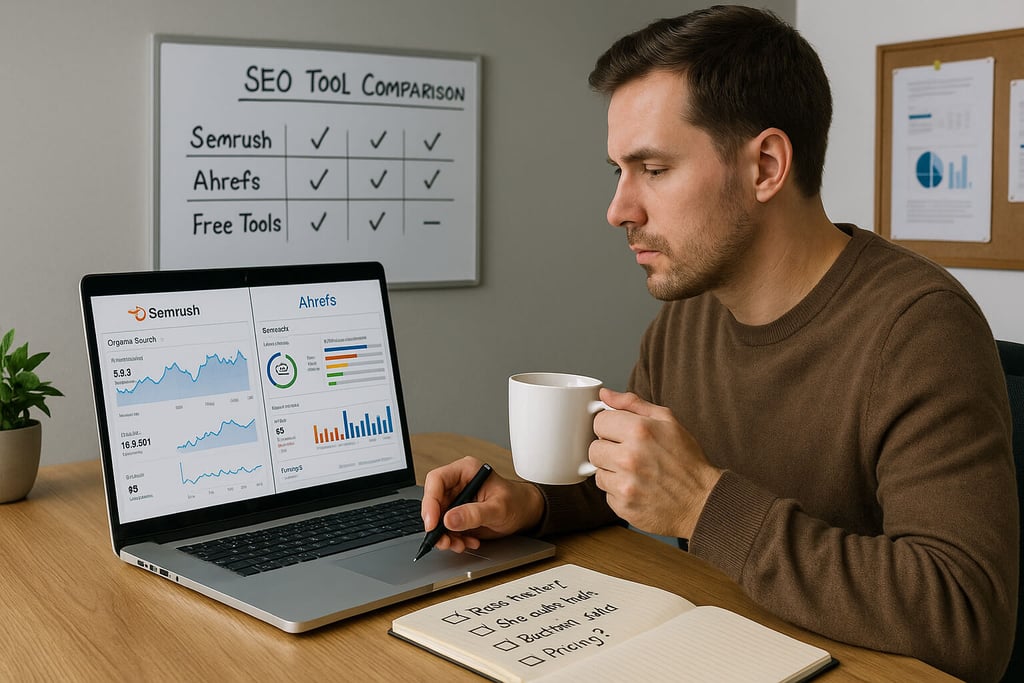SEOJet Flight Blog
Best SEO Tools: Are Paid SEO Tools Like Semrush & Ahrefs Worth It?
Are paid SEO tools worth the investment? Explore the best SEO tools for search engine optimisation & ranking. Compare paid & free SEO tool software options.
SEO STRATEGY
Ardene Stoneman
2/7/20257 min read


Best SEO Tools in 2025: Free and Paid Tools Worth Using
Choosing the right SEO tool in 2025 is more complicated than ever.
With dozens of options available, ranging from completely free tools to expensive SEO platforms, knowing which ones are worth your time or budget can make a real difference to your SEO strategy.
Whether you’re new to SEO or refining a long-standing process, this guide breaks down the best SEO tools - what they do, who they’re for, and whether they’re worth it.
Article Outline
What Makes a Good SEO Tool in 2025?
Are Free SEO Tools Still Worth Using?
When Should You Invest in Paid SEO Tools?
What Is the Best SEO Tool for Keyword Research?
Semrush vs Ahrefs: Which Offers Better Value?
Tools Like Screaming Frog: Are They Still Relevant?
What Are the Best All-in-One SEO Tools?
Which SEO Tools Provide the Best SEO Insights?
How to Use SEO Tools Without Overcomplicating Things
Do SEO Tools Help with Technical SEO?
Free vs Paid: Which Tools Are Best for Beginners?
What Tools Do SEO Professionals Actually Use?
Which SEO Tools Help with On-Page SEO?
Can You Run SEO Without Tools?
Final Thoughts: Are SEO Tools Worth It?
1. What Makes a Good SEO Tool in 2025?
The best SEO tools in 2025 are no longer just about checking rankings. A good SEO tool today offers a full set of features - keyword research, competitor tracking, on-page optimisation, and more.
It should be reliable, accurate, and regularly updated with search engine changes.
You want a tool that provides clear data and makes it easier to hit your SEO goals. Many tools also integrate with platforms like Google Search Console to pull in additional information, which helps you act on insights faster.
The right SEO software depends on what your business needs. For enterprise SEO teams, detailed reporting might be a priority. For a website owner or freelancer, quick insights and ease of use may matter more.
2. Are Free SEO Tools Still Worth Using?
Free SEO tools are still useful, particularly for smaller websites or people new to SEO. They let you run basic checks, spot obvious SEO issues, and carry out keyword research without paying upfront.
Here are a few solid free tools and what they do:
Google Search Console: Great for performance tracking and indexing issues.
Ubersuggest (Free Version): Basic keyword data and site audits.
SEO Minion: A browser add-on that flags on-page SEO issues.
Screaming Frog SEO Spider (Free Version): Crawls up to 500 URLs for site auditing.
While free tools are often limited in features, the right combination of free options can still provide a useful workflow, especially if you’re handling DIY SEO or testing out different tools before committing to a paid plan.
3. When Should You Invest in Paid SEO Tools?
Paid SEO tools are worth considering when you:
Manage multiple websites
Need deeper SEO analysis
Want competitor research features
Work in SEO professionally or in-house
Tools like Ahrefs or Semrush can be expensive, but they save time and give access to data that’s simply not available in free versions. If your SEO work is tied to business revenue, paying for SEO makes sense - these tools often pay for themselves over time.
Many paid tools offer a free trial, so you can test features before deciding. When choosing between different tools, look at not only price but also whether the platform fits your workflow.
4. What Is the Best SEO Tool for Keyword Research?
Keyword research is one of the most common SEO tasks. The right keyword research tool helps you find new opportunities, analyse competition, and group keywords by intent.
Top choices in 2025 include:
Ahrefs: Excellent for keyword ideas, keyword difficulty, and SERP overview.
Semrush: Strong keyword database with useful filters and insights.
Keywords Everywhere: A browser extension for quick data on the go.
Keyword research tools vary in accuracy and database size. For the UK, Semrush generally offers better localised data than some alternatives.
If you’re just starting out, look for tools that offer context - search volume alone isn’t enough.
5. Semrush vs Ahrefs: Which Offers Better Value?
Both Semrush and Ahrefs are premium SEO tools with huge user bases. Each is an all-in-one SEO platform that includes features like backlink analysis, keyword tracking, and competitor research.
Semrush strengths:
PPC and advertising tools
Wider keyword suggestions
Built-in content analysis tools
Ahrefs strengths:
Larger backlink database
Cleaner UI for many users
Stronger keyword explorer for international SEO
They’re priced similarly, and both offer free trials. If you run local SEO campaigns across paid search as well, Semrush might be better.
If you’re focused on content and links, Ahrefs often feels sharper.
6. Tools Like Screaming Frog: Are They Still Relevant?
Screaming Frog SEO Spider remains one of the most popular SEO tools used in the UK and globally. Despite newer alternatives, it’s still the go-to for many technical SEO tasks.
Use it to:
Crawl websites for on-page SEO issues
Export crawl data for audits
Spot duplicate content or broken links
While the interface feels dated, the data it provides is unmatched for quick technical SEO checks. Tools like Sitebulb or JetOctopus have emerged, but many SEO professionals still default to Screaming Frog.
7. What Are the Best All-in-One SEO Tools?
An all-in-one SEO tool combines multiple features in one platform - useful for agencies or businesses looking to streamline their SEO work. These platforms usually handle keyword research, auditing, rank tracking, and competitor analysis.
Popular all-in-one SEO software includes:
Semrush
Ahrefs
SE Ranking
Mangools (KWFinder suite)
SEOJet Jetscan - Designed for practical SEO insights with a straightforward interface. Good for smaller teams or in-house use where speed and clarity matter.
Each tool takes a slightly different approach. If you value simplicity and fast access to core metrics, tools like Jetscan are worth checking out - especially if you’re not looking for every bell and whistle.
8. Which SEO Tools Provide the Best SEO Insights?
SEO tools provide data, but insights are what help you act. The best tools surface ranking changes, keyword movements, technical errors, and trends you might miss.
Reliable sources of SEO insights include:
Ahrefs - for backlink trends and keyword history
Semrush - for keyword visibility and competitor analysis
Google Search Console - for first-party search performance data
SEOJet Jetscan - for clean overviews of what’s working and what’s not, without getting lost in metrics. It’s particularly helpful for time-poor marketers or small business owners.
Choosing a tool that gives you clear, actionable insights can make a noticeable difference to your SEO work - especially when resources are tight.
9. How to Use SEO Tools Without Overcomplicating Things
Many SEO tools come with hundreds of features. It’s easy to overthink it. Most website owners only need to focus on a few metrics: keyword performance, crawl errors, and basic rankings.
If you’re new to SEO, pick a tool with a simple dashboard and only track:
Page indexing
Ranking movement
Keyword impressions
Backlink profile growth
Don’t try to learn everything at once. Use SEO tools to support your work, not distract you from it. You don’t need tools to validate every SEO decision, especially when starting out.
10. Do SEO Tools Help with Technical SEO?
Yes - many SEO tools are designed specifically for technical SEO.
Tools used in the SEO audit process often include:
Screaming Frog: Crawl issues and metadata audits
Ahrefs Site Audit: Clear breakdowns of critical issues
Google Search Console: Core Web Vitals and indexing issues
Sitebulb: Helpful for visualising crawl data and UX impact
Technical SEO is broad, covering indexing, page speed, user experience, and more. Tools provide data, but you still need to understand what to fix and how. Technical fixes without context won’t improve rankings alone.
11. Free vs Paid: Which Tools Are Best for Beginners?
If you’re new to SEO, start with free tools and work your way up.
Good options include:
Google Search Console
MozBar
SEOquake
Ubersuggest (limited)
Screaming Frog (free version)
These free tools and resources cover the basics of keyword tracking, on-page checks, and crawling. As your SEO needs grow, you’ll notice limitations - especially around competitor tracking and keyword research scale.
At that point, exploring paid tools becomes useful.
12. What Tools Do SEO Professionals Actually Use?
Professionals tend to rely on a mix of tools depending on task:
Ahrefs or Semrush: For backlinks, keyword research, and audits
Screaming Frog or Sitebulb: For technical SEO work
Surfer SEO or Page Optimiser Pro: For SEO content tuning
Google Analytics and GSC: For performance tracking
SEOJet Jetscan: For fast overviews, performance summaries, and diagnostics in client campaigns
No serious SEO work happens without tools. While the combination of free and paid tools varies by workflow, the most used tools are trusted because they deliver results.
13. Which SEO Tools Help with On-Page SEO?
On-page SEO tools help you optimise the actual content and structure of your pages.
Useful on-page SEO tools include:
Surfer SEO: Helps structure and optimise content by analysing top-ranking pages
Yoast SEO or Rank Math (WordPress): Assist with meta tags and basic SEO checks
Screaming Frog: Checks for duplicate titles, missing descriptions, and heading structure
SEOJet Jetscan: Flags layout or metadata gaps that could block on-page performance
These tools don’t create content for you, but they highlight problems that could affect rankings. Used properly, they tighten up your site’s on-page structure.
14. Can You Run SEO Without Tools?
You can - but it’s slower and harder. Search engine optimisation without tools means:
Manually checking rankings
Guessing keyword difficulty
Lacking proper backlink tracking
Missing technical issues
Some aspects of SEO, like content creation or user experience, don’t need tools. But for analysis, tracking, and research, tools are essential. Even using a few free SEO tools will save hours of work.
If you’re serious about SEO, it’s worth having at least one reliable SEO tool at hand.
15. Final Thoughts: Are SEO Tools Worth It?
SEO tools are definitely worth the investment for anyone doing ongoing SEO work. Whether you’re using a free tool for quick checks or a premium SEO tool for deep analysis, they improve efficiency and accuracy.
The best SEO tools in 2025 balance power with usability. You don’t need dozens of tools - just the right ones for your workflow. A good SEO tool is a long-term asset.
Summary: What to Remember
A good SEO tool gives reliable, actionable insights.
Free SEO tools are useful but limited - great for beginners or small sites.
Paid tools like Ahrefs and Semrush offer deep data and competitor tracking.
Technical SEO tools save hours of crawling and fixing issues.
On-page SEO tools help fine-tune your site content and structure.
You don’t need tools to start SEO, but they’re essential to scale it.
Choose tools that match your workflow, not just popularity.
Free trials are a smart way to test paid tools before committing.
Tools provide data - but you still need to make decisions.
Tools like SEOJet Jetscan offer a clean, efficient experience for practical campaigns.
Need help picking the right SEO tools or streamlining your SEO process?
Talk to SEOJet - we help businesses build simple, effective SEO systems that actually get results.
Services
Contact Us
Newsletter Signup
sales@seojet.co.uk
01934 289 404
© 2025. All rights reserved.


Locations
Weston-super-Mare
Somerset
Bristol
9am - 6pm, Monday to Friday
Suite 2, Unit 7, 12 Beaufigter Rd, Weston-super-Mare, BS24 8EE
